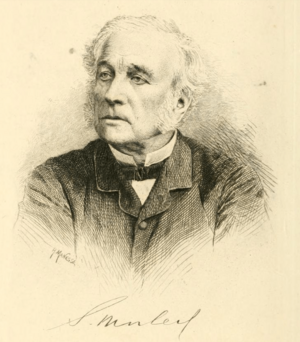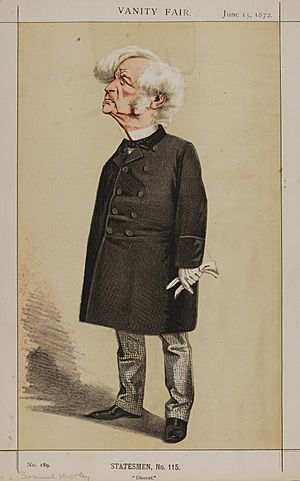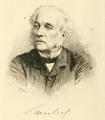Samuel Morley (MP) facts for kids
Samuel Morley (born October 15, 1809 – died September 5, 1886) was an important English businessman and politician. He made a lot of money as a wool manufacturer. He was also known for being a very generous person, helping many charities. He was a member of the Congregational church, which was a type of Protestant church. Morley also strongly supported ending slavery and was a member of the British Parliament.
Contents
Who Was Samuel Morley?
Samuel Morley was the youngest son of John Morley, who owned a hosiery (sock and stocking) business. His family's business started in Nottingham and later opened offices in London. Samuel began working for his father's company in London when he was young.
Taking Over the Family Business
When his father and brothers decided to retire, Samuel took charge of the business. By 1860, he owned both the London and Nottingham parts of the company. The business grew very quickly and became the largest of its kind in the world. Samuel Morley became very rich, and he was known as a good employer who treated his workers well.
Life in London and Publishing
Morley lived in a large house in Stamford Hill, Stoke Newington, and also had an address in the City of London. He was a dedicated member of the King's Weigh House Congregational Chapel.
He also got involved in publishing. He became one of the owners of Daily News, which was a major newspaper for the Liberal political party at the time. By making the newspaper cheaper, he helped it become more popular and influential.
Morley's Political Career
As a member of the Liberal Party, Samuel Morley was a strong supporter of William Ewart Gladstone, who was a famous Prime Minister. Morley was elected as a Member of Parliament (MP) for Nottingham in 1865. Later, he became an MP for Bristol, serving from 1868 to 1885.
Samuel Morley: A Generous Helper
Samuel Morley was often called the "Philanthropic Merchant" because he gave so much money to good causes. A writer in the Annual Register of World Events said that people would remember him as one of the most important business leaders and generous people of his time.
Supporting Education
Morley helped many charities and educational projects.
- He provided money to start Morley College in London, which offered education for adults.
- He was also the treasurer of Homerton College. He led the opening of the new "Training Institution of the Congregational Board of Education" in 1852. This college helped train teachers.
Promoting Peace and Temperance
In the late 1850s, Samuel Morley was the President of the London Peace Society. He helped organize a meeting in 1859 against the war happening in Italy at that time. Later in his life, he became a strong supporter of the Temperance movement, which encouraged people to drink less alcohol.
Fighting Against Slavery
Samuel Morley was a strong supporter of abolitionism, which was the movement to end slavery. This cause was important to many British politicians and reformers in the 1800s.
Helping Josiah Henson
Morley became the treasurer of a fund that helped Josiah Henson. Josiah Henson was an American slave who had escaped to freedom. Morley and another generous person, George Sturge, helped support Henson in Britain. Josiah Henson later wrote his autobiography, Uncle Tom's Story of His Life. Samuel Morley and George Sturge wrote an introductory note for the book.
In his autobiography, Josiah Henson wrote about Morley's kindness:
I received numerous tokens of regard from many philanthropic gentlemen while I was in London, which I shall never forget; but I was particularly touched by the special kindness of Samuel Morley, Esq., and George Hitchcock, Esq., of St. Paul's Churchyard. These two gentlemen invited me to dine with them every day.
Morley's Family Life
Samuel Morley married Rebekah Maria Hope. Her father was Samuel Hope from Liverpool.
- Their oldest son, Samuel, later became the Governor of the Bank of England. He was given the title of Baron Hollenden in 1912.
- Their younger son, Arnold Morley, also became a Liberal politician.
Remembering Samuel Morley
There are several ways Samuel Morley is remembered today.
- A statue of him stands in Bristol.
- There is also a memorial at his burial place in Abney Park Cemetery in Stoke Newington, London. This memorial is a simple, raised tomb, which was common for nonconformists (people who did not follow the official Church of England) like Morley.
- A statue of Morley, made by Joseph Else, can be found at the Waverley Street entrance to The Arboretum, Nottingham. It describes him as an MP, a merchant, and a philanthropist.
- In 1889, a chapel was built in Nottingham and named the Morley Memorial Chapel in his honor.
Images for kids
 | Leon Lynch |
 | Milton P. Webster |
 | Ferdinand Smith |





